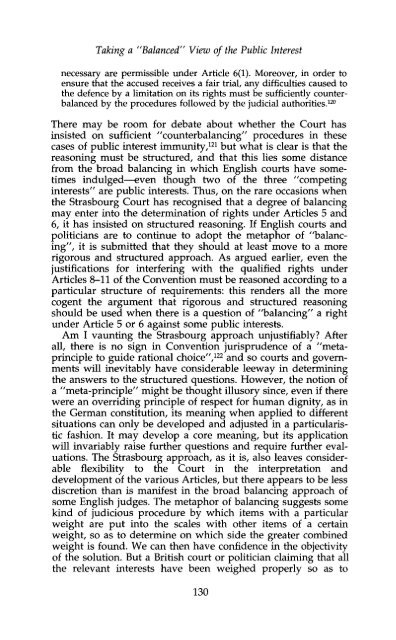Human Rights, Serious Crime and Criminal Procedure - College of ...
Human Rights, Serious Crime and Criminal Procedure - College of ...
Human Rights, Serious Crime and Criminal Procedure - College of ...
- No tags were found...
You also want an ePaper? Increase the reach of your titles
YUMPU automatically turns print PDFs into web optimized ePapers that Google loves.
Taking a "Balanced" View <strong>of</strong> the Public Interestnecessary are permissible under Article 6(1). Moreover, in order toensure that the accused receives a fair trial, any difficulties caused tothe defence by a limitation on its rights must be sufficiently counterbalancedby the procedures followed by the judicial authorities. 120There may be room for debate about whether the Court hasinsisted on sufficient "counterbalancing" procedures in thesecases <strong>of</strong> public interest immunity, 121 but what is clear is that thereasoning must be structured, <strong>and</strong> that this lies some distancefrom the broad balancing in which English courts have sometimesindulged—even though two <strong>of</strong> the three "competinginterests" are public interests. Thus, on the rare occasions whenthe Strasbourg Court has recognised that a degree <strong>of</strong> balancingmay enter into the determination <strong>of</strong> rights under Articles 5 <strong>and</strong>6, it has insisted on structured reasoning. If English courts <strong>and</strong>politicians are to continue to adopt the metaphor <strong>of</strong> "balancing",it is submitted that they should at least move to a morerigorous <strong>and</strong> structured approach. As argued earlier, even thejustifications for interfering with the qualified rights underArticles 8-11 <strong>of</strong> the Convention must be reasoned according to aparticular structure <strong>of</strong> requirements: this renders all the morecogent the argument that rigorous <strong>and</strong> structured reasoningshould be used when there is a question <strong>of</strong> "balancing" a rightunder Article 5 or 6 against some public interests.Am I vaunting the Strasbourg approach unjustifiably? Afterall, there is no sign in Convention jurisprudence <strong>of</strong> a "metaprincipleto guide rational choice", 122 <strong>and</strong> so courts <strong>and</strong> governmentswill inevitably have considerable leeway in determiningthe answers to the structured questions. However, the notion <strong>of</strong>a "meta-principle" might be thought illusory since, even if therewere an overriding principle <strong>of</strong> respect for human dignity, as inthe German constitution, its meaning when applied to differentsituations can only be developed <strong>and</strong> adjusted in a particularisticfashion. It may develop a core meaning, but its applicationwill invariably raise further questions <strong>and</strong> require further evaluations.The Strasbourg approach, as it is, also leaves considerableflexibility to the Court in the interpretation <strong>and</strong>development <strong>of</strong> the various Articles, but there appears to be lessdiscretion than is manifest in the broad balancing approach <strong>of</strong>some English judges. The metaphor <strong>of</strong> balancing suggests somekind <strong>of</strong> judicious procedure by which items with a particularweight are put into the scales with other items <strong>of</strong> a certainweight, so as to determine on which side the greater combinedweight is found. We can then have confidence in the objectivity<strong>of</strong> the solution. But a British court or politician claiming that allthe relevant interests have been weighed properly so as to130
















